 A talk by Giriraj Swami on January 2, 2010, Bhaktivedanta Manor, England.
A talk by Giriraj Swami on January 2, 2010, Bhaktivedanta Manor, England.
We have gathered at the lotus feet of Srila Prabhupada in this wonderful temple of Sri Sri Radha-Gokulananda, Sri Sita-Rama-Laksmana-Hanuman, and Sri Sri Gaura-Nitai, in the presence of His Holiness Radhanath Swami and so many exalted devotees. We are entering the New Year, 2010, and the next decade, and on such occasions we take stock of what and how we did in the previous year and what we want to do in the next. Studies have shown, and probably many of us have experienced, that most New Year’s resolutions are broken during the first week. Still more are broken in the first month, and almost all are broken within the first three months.
Why does this happen, and what can we do? Man is a creature of habit. We have developed certain habits over the past however many years—perhaps lifetimes—and to change our habits requires sincere desire and determined effort. Another study has shown that when a person is trying to develop a new habit, he has to consistently, diligently strive to adhere to the new practice for at least thirty days. After thirty days, he is able to follow more easily but can be derailed by stress or changes in his life. After ninety days it becomes just as easy to follow the new habit as not, and after a year it is easier to follow the new habit than not.
So, what new habits do we want to develop in the next year? That depends on our goals. When I visited Pune some years ago, the Malhotra brothers arranged a program for me in the main hall, and at the end of the talk the general in charge of the Southern Command of the Indian Army asked an important question: “What is the aim for which we are born, what is the aim of our life? It certainly could not be to amass some wealth and ultimately die, or to make a building and then die, or to marry and procreate and then die. For our minor activities in life we have the aims set first, before we get going to achieve them. When we train our people in the army, whatever they have to do we first tell them what the aim is. And once they are clear what the aim is, then we decide what means to adopt to achieve that. And invariably we don’t go wrong. Now here it is—my whole life is going to waste, to my mind; I am still not very clear what is the aim of my life. Would you kindly enlighten us about the aim of life so that thereafter we can be very, very clear as to what we have got to do to achieve that aim?”
Srila Sanatana Gosvami asked the same question of Sri Chaitanya Mahaprabhu:
“‘ke ami’, ‘kene amaya jare tapa-traya’
iha nahi jani—kemane hita haya
“‘sadhya’-‘sadhana’-tattva puchite na jani
krpa kari’ saba tattva kaha ta’ apani”
“Who am I? Why do the threefold miseries always give me trouble? If I do not know this, how can I be benefited? Actually I do not know how to inquire about the goal of life and the process for obtaining it. Being merciful upon me, please explain all these truths.” (Cc Madhya 20.102–103) He said, “In ordinary dealings people consider me to be a learned scholar (pandita), but I am so learned I do not even know who I am. So please tell me who I am and what is the goal of life.” And Lord Chaitanya replied, “By constitution you are an eternal servant of Krishna —jivera ‘svarupa’ haya—krsnera ‘nitya-dasa’—and the goal of life is to be reinstated in your constitutional position as His loving servant.”
If someone understands that he is not the body, that he is the soul within the body, and that his real relationship is not with the body or things related to the body but that as a spiritual soul his real relationship is with the Supreme Soul, then he can adopt the methods that are suitable for reviving his eternal relationship with the Supreme Soul, Krishna.
Srila Prabhupada formed the International Society for Krishna Consciousness to give people this knowledge: We are not the body but the soul, part and parcel of the Supreme Soul. Our real relationship is with Him, and our duty and goal in life, is to revive our eternal loving relationship with Him, with God, Krishna. The whole process of sadhana-bhakti is to help us to awaken that eternal love for God.
nitya-siddha krsna-prema ‘sadhya’ kabhu naya
sravanadi-suddha-citte karaye udaya
“Pure love for Krsna is eternally established in the hearts of the living entities. It is not something to be gained from another source. When the heart is purified by hearing and chanting, this love naturally awakens.” (Cc Madhya 22.107) That love is eternally there within the heart, just as fire is within a match. You just have to strike the match and the fire will come out. Similarly, we just have to strike the heart by chanting and hearing about Krishna and that love will come out.
The main process is the chanting of the holy names of the Lord. We are in the Hare Krishna temple. (On the way, we saw the sign, “Hare Krishna Temple,” with an arrow.) Somehow, we are part of the Hare Krishna movement, and we are known as Hare Krishna people. We are meant to chant Hare Krishna. And by our chanting Hare Krishna, the mirror of the mind can be cleansed (ceto-darpana-marjanam), the blazing fire of material existence extinguished (bhava-maha-davagni-nirvapanam), and ultimately our dormant love for Krishna awakened. Param vijayate sri-krsna-sankirtanam.
But there is also the matter of quality to the chanting. Queen Kunti prays to Lord Krishna,
janmaisvarya-sruta-sribhir
edhamana-madah puman
naivarhaty abhidhatum vai
tvam akincana-gocaram
“Your Lordship can easily be approached, but only by those who are materially exhausted. One who is on the path of [material] progress, trying to improve himself with respectable parentage, great opulence, high education, and bodily beauty, cannot approach You with sincere feeling.” People on the path of material advancement want good birth (janma), material opulence (aisvarya), material learning (sruta), and physical beauty (sribhih). They cannot feelingly approach the Lord. And when we chant the holy name, we are trying to approach the Lord. The holy name of Krishna and Krishna Himself are the same.
nama cintamanih krsnas
caitanya-rasa-vigrahah
purnah suddho nitya-mukto
’bhinnatvan nama-naminoh
“The holy name of Krsna is transcendentally blissful. It bestows all spiritual benedictions, for it is Krsna Himself, the reservoir of all pleasure. Krsna’s name is complete, and it is the form of all transcendental mellows. It is not a material name under any condition, and it is no less powerful than Krsna Himself. Since Krsna’s name is not contaminated by the material qualities, there is no question of its being involved with maya. Krsna’s name is always liberated and spiritual; it is never conditioned by the laws of material nature. This is because the name of Krsna and Krsna Himself are identical.” (Padma Purana, Cc Madhya 17.133)
Commenting on Kunti’s prayer, Srila Prabhupada cites scripture, that by uttering the holy name of the Lord even once, one can destroy the reactions to more sins than one is able to commit. “Such is the power of uttering the holy name of the Lord. There is not the least exaggeration in this statement. Actually, the Lord’s holy name has such powerful potency.” We are all suffering because of sinful reactions. If we were freed from sinful reactions, we would no longer have to suffer. As Prabhupada explains, however, “there is a quality to such utterances also. It depends on the quality of feeling. A helpless man can feelingly utter the holy name of the Lord, whereas a man who utters the same holy name in great material satisfaction cannot be so sincere.” Lord Krishna is akincana-gocaram, easily approached by those who are akincana, who have no material possessions.
Now, these statements may give rise to some questions. This word akincana means “without material possessions,” or “without a sense of false proprietorship.” Of course, there should be no duplicity in the matter, but this principle allows us, for example, to have an opulent temple here. We have a beautiful property, a large estate, but as long as we think, “This is Radha-Gokulananda’s property. This is Srila Prabhupada’s property. It is not my property; I am here only to serve them and use this property in their service,” we can be free from false proprietorship, false prestige, and false designations. And in that mood we can chant the holy name with feeling, approach Krishna with feeling. Otherwise, there is a subtle rivalry going on between us and Krishna. We come into the material world out of envy of Krishna. In effect, we want to take His position. We want to be the proprietor and controller and enjoyer (isvaro ’ham aham bhogi), which is actually Krishna’s position. While chanting Krishna’s name, we may be thinking, “Why should I be chanting Krishna’s name? People should be chanting my name. ‘Giriraj Maharaja ki jaya!’ ” That is our sorry plight. We don’t want Krishna to be the center; we want to be the center. So we chant the holy name with ourselves in the foreground and the holy name in the background. That is our tendency as conditioned souls.
The proper process is to chant with attention. We let go of all those thoughts about ourselves—“I” and “me” and “mine”—and focus on the holy name, on Krishna. Those other thoughts are irrelevant. They may come up, but we don’t pay them heed. We just focus our attention on Krishna, on the sound of Krishna’s holy name. And when we do that, we can actually feel His presence. We can appreciate that the holy name is Krishna Himself reciprocating with our sincere desires to serve Him.
This practice requires effort. We are habituated to think that we are the center of existence and that everything revolves around us. We see everything in terms of us, not in terms of Krishna. But our habit can change. There is a saying that up to the age of twenty, you think that people are looking at you and like you, from the age of twenty to forty that they are looking at you and don’t like you, and then, after the age of forty, that they aren’t even looking at you or thinking of you. So, we have to reform this habit of thinking that we’re the center, always thinking about ourselves and thinking that everyone else is thinking about us too. We must know that Krishna is the center.
Once, when I was chanting my rounds at the beach in Carpinteria, I was sitting alone, chanting with attention—making a serious effort to be attentive—somehow thinking of different people who were close to me, and feeling how much they were suffering. I was actually feeling their pain. As I continued chanting, that sense of feeling for others expanded to people who weren’t so close to me, and then to the people on the beach, whom I didn’t even know. There weren’t many, but there were a few people surfing. And I was really feeling their suffering. Srila Prabhupada had joked that the surfers were actually “sufferers,” but I was actually feeling their suffering.
Then the feeling went beyond the human beings. There were pelicans at the beach. They fly very high and then suddenly zoom down and crash into the water. I understood that they were hovering high in the sky looking for prey and that when they saw some potential food they came straight down and crashed into the water. Ordinarily I would think, “Oh, how picturesque—flying so high and then diving into the ocean.” But now I was feeling, “They are in anxiety. They are hungry. They need food and are searching—‘Where is food? Where is food?’ And when they see something and dive straight down and crash into the water, although they are birds, still, coming from that height at that velocity and crashing into the water is bound to be a shock to their system. And they don’t know whether they will actually get that fish or not. And whatever happens, after they come down they go up and start the same process all over again. They are never satisfied—“Now we can just relax.” I was thinking, “What a life, full of anxiety, full of pain”—and feeling it.
And the dolphins and the sandpipers and the seagulls—the same thing. I was feeling so much suffering on all sides. It was as if the illusion of material happiness and charm had been lifted, and this whole beautiful panorama became a horrible scene of intense suffering, which I was feeling. And I was just chanting, chanting, chanting. Then a little lady bug landed on my hand. Growing up, I thought that lady bugs were auspicious and cute. But this time I looked at the lady bug and thought, “This lady bug is suffering”—and, again, feeling it. Looking at the lady bug, I thought, “I don’t think I can take much more of this. I am feeling too much suffering; I am going to have a breakdown.” I wanted to help these creatures. I was feeling their suffering and desiring to help them, but it was getting to be too much.
Then I had the type of breakthrough that one gets when one chants with attention, with the effort to chant with attention. Suddenly I felt as if Krishna were speaking to me, revealing something to me. I got the intuition, or inspiration, in my heart that Krishna loves these creatures more than I do, more than I can even imagine. He loves them so much that He accompanies them as the Supersoul in whatever species of life they enter. And not only does He love them more than I can ever imagine, but He can actually do something to help them. I may feel for them and want to help them, but what is my capacity to help them? I may not even understand what’s troubling them. Parents sometimes experience that their baby is crying and want to help but don’t know what the baby wants. They may think the baby is hungry, but the baby may be troubled by something completely different. Or even if they do understand what is causing the suffering, they may be unable to relieve it.
So, I was thinking, “Not only does Krishna love them, but He can actually do something to help them.” And then I came to the bottom of it. The problem was that I was trying to take the position of Krishna. In the Bhagavad-gita (5.29) Lord Krishna says,
bhoktaram yajna-tapasam
sarva-loka-mahesvaram
suhrdam sarva-bhutanam
jnatva mam santim rcchati
“A person in full consciousness of Me, knowing Me to be the ultimate beneficiary of all sacrifices and austerities, the Supreme Lord of all planets and demigods, and the benefactor and well-wisher of all living entities, attains peace from the pangs of material miseries.”
When one recognizes that Krishna is the enjoyer, Krishna is the proprietor, Krishna is the best friend, he attains peace. I thought of what Srila Prabhupada often said, so simple yet profound—that your best friend is not he or she who poses as your best friend but he {or she }who tells you that Krishna is your best friend. Suddenly this whole problem of how to help these suffering souls became very easy. I didn’t have to help them personally; I just had to direct them to Krishna, who could really help them. And it was such a relief.
So this is our mission: to serve Krishna. And serving Krishna means doing what Krishna wants, and Krishna wants that we should bring other souls to Him. As He says at the end of the Bhagavad-gita (18.69), His dearmost servant is he who preaches the message of the Gita. Na ca tasman manusyesu kascin me priya-krttamah/ bhavita na ca me tasmad anyah priyataro bhuvi: “There is no servant in this world more dear to Me than he, nor will there ever be one more dear.” Sri Krishna Chaitanya Mahaprabhu also said, yare dekha, tare kaha ‘krsna’-upadesa: “Wherever you go, whomever you meet, just present the message of Krishna.” And that is something any of us can do. It is actually very easy. Any of us can do it.
When devotees, myself among them, first came to Bombay, two of Prabhupada’s early disciples, Syamasundara and Malati, had a small daughter, Sarasvati, who used to approach respectable gentlemen who visited our center. Although only three or four years old, she would approach them and say, “Do you know who is Krishna?” And then she would answer, “Krishna is the Supreme Personality of Godhead.” Srila Prabhupada commented, “That is preaching. She is repeating what she has heard from authorities, and even if she doesn’t have full realization, what she is saying is perfect, because she has heard it from authorities— Krishna is the Supreme Personality of Godhead.” So, any of us can preach. We can simply repeat what we have heard from authorities—“Krishna is the Supreme Personality of Godhead.” “Chant Hare Krishna and your life will be sublime.” “Come to the Hare Krishna temple.” And that will please Krishna.
I was very happy when I passed through England on my way to South Africa at the end of November and saw all the books around Srila Prabhupada’s vyasasana. I could feel the mood in the atmosphere to distribute Srila Prabhupada’s books. I felt, “Srila Prabhupada is pleased. They have the spirit to distribute his books.” The books are as potent and effective now as ever. So many people I meet—when I ask them how they came to Krishna consciousness, it goes back to a book. They got a book. The formula that Srila Prabhupada gave us forty years ago still works. By giving them Prabhupada’s books, we are giving them Krishna and Prabhupada, the message of Krishna through Prabhupada, and that is enough to awaken their sense of Krishna consciousness and begin them on the path. Many of us are here because of Srila Prabhupada’s books.
So, we should try to develop the habit of putting Krishna in the center, putting the holy name in the center, putting Sri Chaitanya Mahaprabhu and Srila Prabhupada and their mission in the center, and that will make all the difference. Our spouse can be there, our children can be there, our house can be there, our work can be there—everything can be there—but with Krishna in the center, everything will be beautiful and peaceful. And as long as we persist in habits that may have been with us for many lifetimes—thinking that we are the center, we are the lords, we are the enjoyers, we are the proprietors—there will be so many problems, and in the end whatever we have will be taken away from us anyway.
So it is most auspicious that we are beginning the New Year in the association of devotees here at Bhaktivedanta Manor. My request is that we use this coming year, and this valuable human form of life, for their proper purpose, in Krishna consciousness, and that in this endeavor we help and support each other. We can’t do it alone. And I pray that I can always remain in the association of such wonderful devotees, because I am sure that in this association, hearing their instructions, I will be nudged along on the right path, back home, back to Godhead.
Hare Krishna.
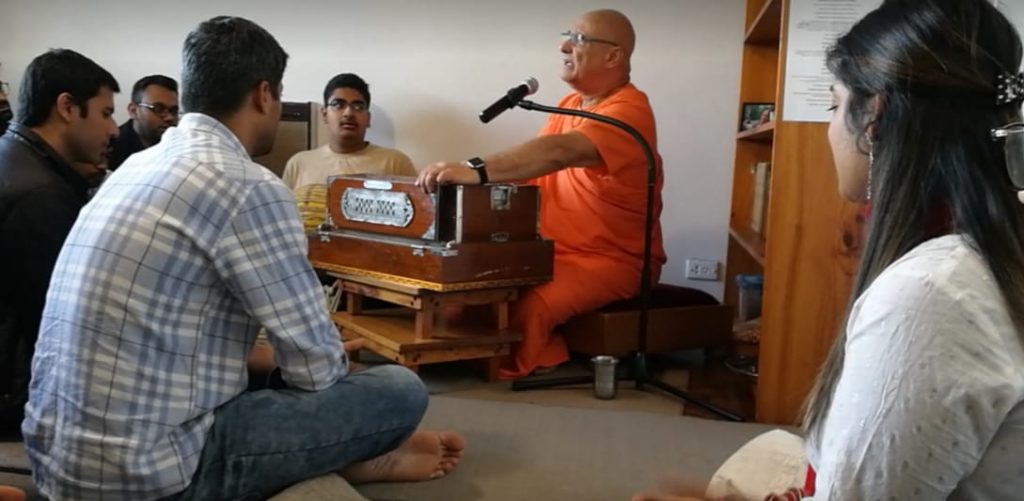
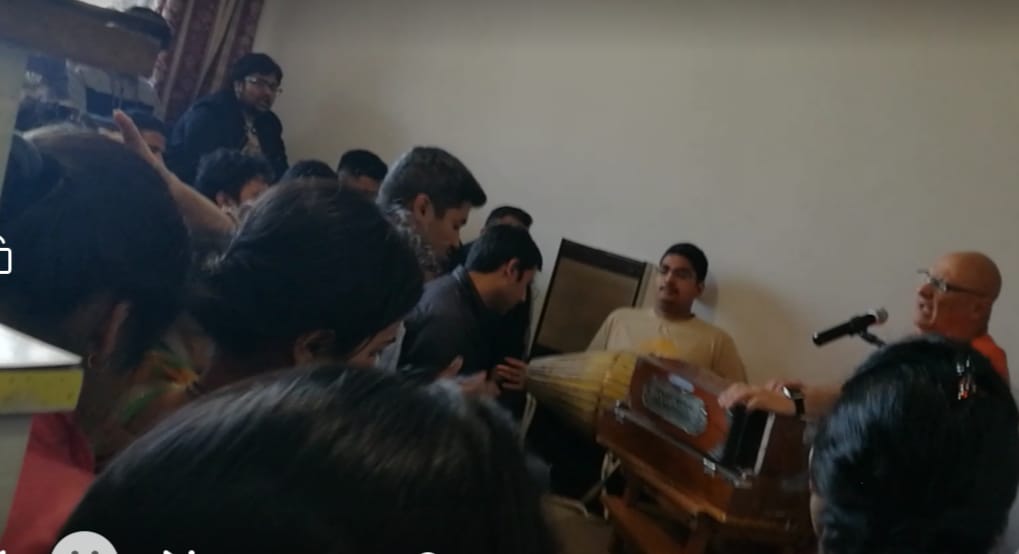
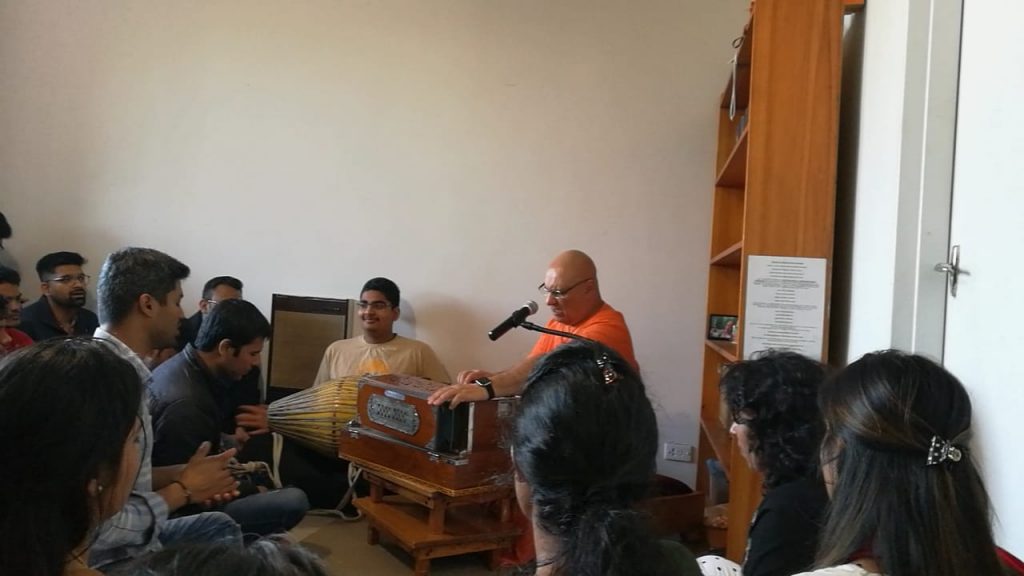


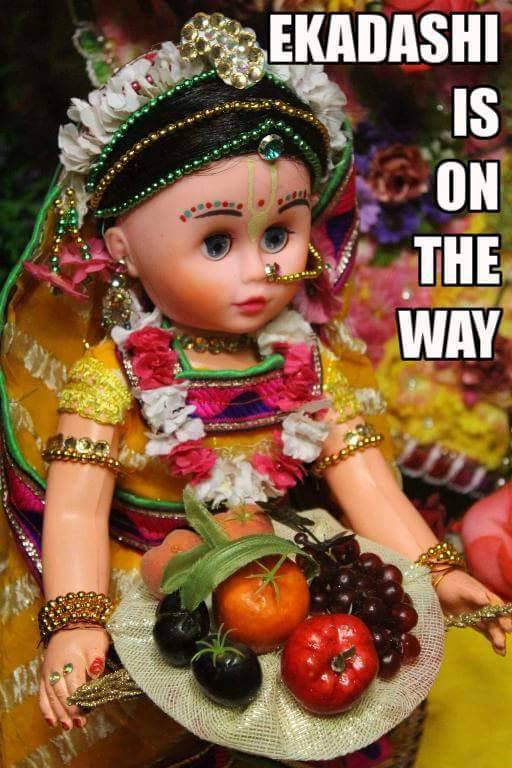
 Adult Education At The Temple
Adult Education At The Temple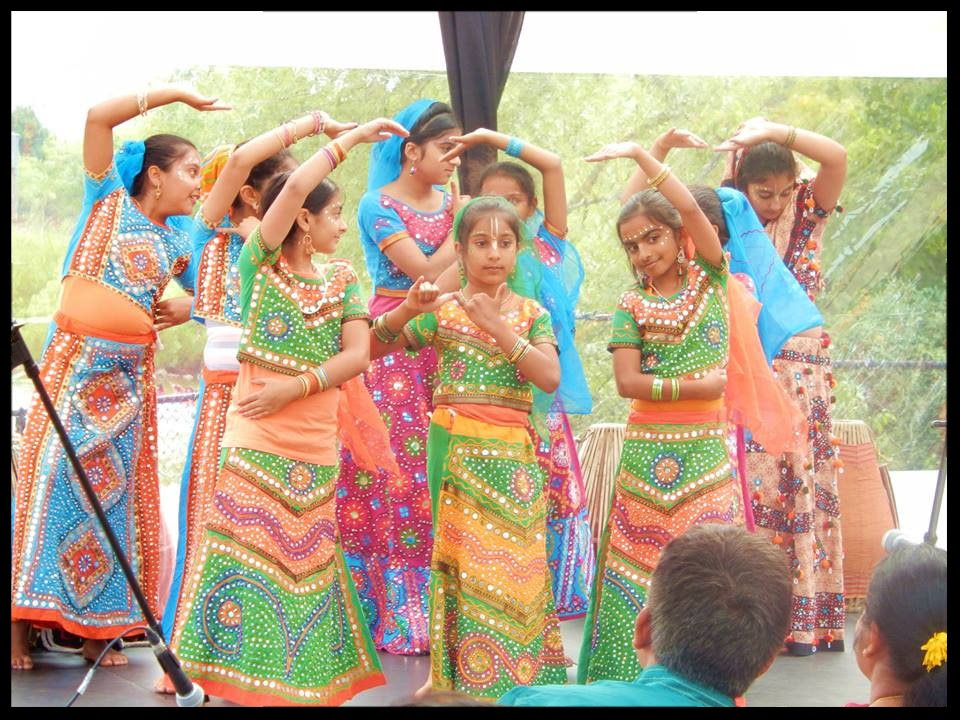

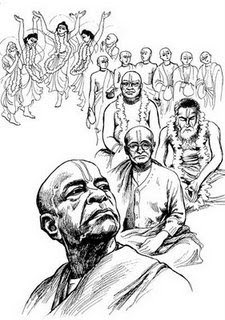





















 Gopal Bhatta das: The GBC Organizational Development Committee is a standing committee of ISKCON’s GBC. We strive to provide proper organizational structure designed to create global alignment and ensure devotional standards and ethos throughout the society. Global alignment will also provide a more unified society with clearer lines of authority, culture, strategy, and performance. We believe in “More Devotees, Happier Devotees”. We are looking for enthusiastic individuals to join our team. This devotional opportunity offers service on a global level.
Gopal Bhatta das: The GBC Organizational Development Committee is a standing committee of ISKCON’s GBC. We strive to provide proper organizational structure designed to create global alignment and ensure devotional standards and ethos throughout the society. Global alignment will also provide a more unified society with clearer lines of authority, culture, strategy, and performance. We believe in “More Devotees, Happier Devotees”. We are looking for enthusiastic individuals to join our team. This devotional opportunity offers service on a global level. This year for sure I will grow lungs, feet, learn to walk… Acccording to Darwin…:-)
This year for sure I will grow lungs, feet, learn to walk… Acccording to Darwin…:-)
 New Ahimsa Milk truck. Love (and offer to Krishna) milk. Hate slaughter (of innocent cows). Raw and whole pasteurized milk are currently being delivered to doorstep/drop-point locations in the North London/within M25 area, and throughout the rest of the UK via mailorder. We already have a very long milk waiting list and therefore the list is closed to new submissions at this time. Sorry. Come and visit us at a farmers’ market if you are in London where you can still buy our raw milk.
New Ahimsa Milk truck. Love (and offer to Krishna) milk. Hate slaughter (of innocent cows). Raw and whole pasteurized milk are currently being delivered to doorstep/drop-point locations in the North London/within M25 area, and throughout the rest of the UK via mailorder. We already have a very long milk waiting list and therefore the list is closed to new submissions at this time. Sorry. Come and visit us at a farmers’ market if you are in London where you can still buy our raw milk.







 By Vijaya Das
By Vijaya Das